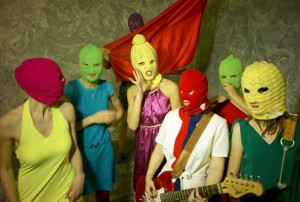in brief: pussy riot free at last
Russian Feminist punk rockers, Pussy Riot are finally set to be released from prison after a year in Siberian prison camps and global outcry.
Thanks to a new, PR-friendly change to Russia’s laws, the remaining two band members Nadezha Tolokonnikova and Maria Alyokhina still behind bars are to be freed. A third Pussy Riot member, Yekaterina Samutsevich, successfully appealed her sentence late last year.
A new amnesty law grants leniency to nonviolent offenders, first-time offenders, as well as offenders with small children. Both Tolokonnikova and Alyokhina have small children. The bill, which was passed the Russian legislature with unanimous support (including that of President Vladimir Putin), has been widely regarded as Russia attempting to improve its image prior to its hosting of the Winter Olympic Games in Sochi in February 2014. The country’s policy has come under fire recently with its horrific anti-gay laws, with many support staff, fans and even athletes threatening to boycott the games. This latest change in policy is in hopes to boost the support, morale and hopefully tourist lure to the games.
Both Tolokonnikova and Alyokhina were set to return home in March regardless of the new policy after completing their two-year sentence; however it is still great news that the women have finally been released from prison. The initial news of their imprisonment sparked global outrage towards Russian policy, and support for the band members, including from such high-profile sources as United States President, Barack Obama and a wide range of musicians including Madonna, Courtney Love, Sting, Tori Amos and Yoko Ono, as well as numerous others via social media.
The initial grounds for their arrest in February/March 2012 were officially deemed ‘hooliganism motivated by religious hatred’ following the band’s performance at Moscow’s Cathedral of Christ the Saviour. After church security officials stopped the performance, it had been turned into a music video entitled ‘Punk Prayer – Mother of God, Chase Putin Away!’ (many of the band’s lyrical themes include opposition to Putin’s policies, their regarding him as a dictator, as well as his relationship with the leadership of the Russian Orthodox Church). Samutsevich was freed on probation with a suspended sentence after her lawyers successfully argued that the church guard prevented her from removing her guitar from its case. However, both Tolokonnikova and Alyokhina’s two-year sentences were upheld, and the two were separated and sent to prison.
The trial and sentence attracted attention worldwide, particularly in the West. The case was adopted by human rights groups including Amnesty International, which deemed the women to be prisoners of conscience. However, public opinion in Russia was generally less sympathetic towards the women. This is including President Putin (unsurprisingly), who stated that the band had ‘undermined the moral foundations’ of Russia and ‘got what they asked for’ with their subsequent sentences.
Putin’s stance, despite the new law, has not softened in regards to Pussy Riot, stating ‘I was not sorry that they [Pussy Riot] ended up behind bars. I was sorry that they were engaged in such disgraceful behaviour, which in my view was degrading to the dignity of women.’
Common sense would have thought that if Putin wanted to increase favour towards his country in the lead-up to the Winter Games, he would have avoided statement such as this.


